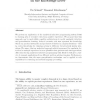Free Online Productivity Tools
i2Speak
i2Symbol
i2OCR
iTex2Img
iWeb2Print
iWeb2Shot
i2Type
iPdf2Split
iPdf2Merge
i2Bopomofo
i2Arabic
i2Style
i2Image
i2PDF
iLatex2Rtf
Sci2ools
115
click to vote
COGSR
2011
2011
Inductive rule learning on the knowledge level
We present an application of the analytical inductive programming system Igor to learning sets of recursive rules from positive experience. We propose that this approach can be used within cognitive architectures to model regularity detection and generalization learning. Induced recursive rule sets represent the knowledge which can produce systematic and productive behavior in complex situations – that is, control knowledge for chaining actions in different, but structural similar situations. We argue, that an analytical approach which is governed by regularity detection in example experience is more plausible than generate-and-test approaches. After introducing analytical inductive programming with Igor we will give a variety of example applications from different problem solving domains. Furthermore, we demonstrate that the same generalization mechanism can be applied to rule acquisition for reasoning and natural language processing.
Analytical Inductive Programming | COGSR 2011 | Distributed And Parallel Computing | Recursive Rule | Regularity Detection |
Related Content
| Added | 15 May 2011 |
| Updated | 15 May 2011 |
| Type | Journal |
| Year | 2011 |
| Where | COGSR |
| Authors | Ute Schmid, Emanuel Kitzelmann |
Comments (0)

